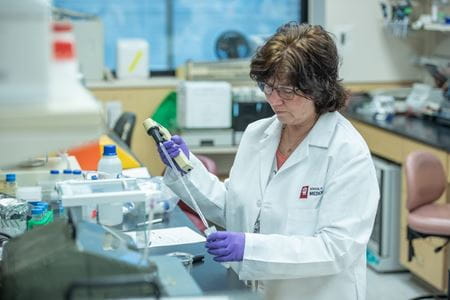INDIANAPOLIS -- A new five-year, $3.9 million grant from the National Institute of Allergy and Infectious Diseases will enable Indiana University School of Medicine researchers to explore how allergies and asthma may be passed from mothers to their children, presenting a better understanding of how allergies develop and paving the way for transformative approaches to allergy prevention and management.
The research expands upon the established association between parental allergic history and heightened allergy susceptibility in children, an area of sustained interest for IU School of Medicine Professor of Pediatrics Joan Cook-Mills, PhD. The Cook-Mills lab, part of the school’s Herman B Wells Center for Pediatric Research, focuses on studying the specific reasons behind the development of allergic disease, asthma and food allergy in infants and children born from mothers with allergies.
"Our long-term goal is to determine the influence of mothers’ allergies on their children, both in the womb and after birth," Cook-Mills said. "We believe there's a molecular trigger being passed from mothers to their offspring that then increases offspring responses to allergens, and this new grant will help us dive deeper into that immune system connection."
Research from the Cook-Mills lab revealed mothers with allergies have elevated levels of a specific lipid within the eicosanoid class of lipids, suggesting this lipid may have a potential influence on their offspring also developing allergies. The group’s ongoing work aims to unravel the mechanisms behind this influence, including the transfer of this eicosanoid from a mother to her child, its impact on immune cell development and its role in the balance of lung bacteria.
Their research will concentrate on four areas:
- Investigating the potential impact of how higher levels of a particular lipid from mothers' lungs may affect their infants' susceptibility to allergens. This exploration will assess whether this eicosanoid is transmitted during pregnancy or breastfeeding.
- Examining whether elevated levels of a specific eicosanoid in allergic mothers leads to their offspring’s fetal liver and bone marrow making more of a type of immune cell called dendritic cells, and if this affects the offspring’s allergic responses. The research will also investigate the correlation between the eicosanoid levels in human cord blood plasma and allergic responses, exploring the link between allergies and the number of immune cells in the umbilical cord.
- Assessing whether elevated eicosanoids in allergic mothers can affect the lung microbiome in mothers and their offspring, potentially leading to altered lung bacteria, which can impact immune cell responses to allergies and asthma.
- Assessing whether the altered lung microbiome actively changes the production of this eicosanoid in the lungs of allergic mothers.
“We're thrilled about the potential impact of this research, as our findings could pave the way for future clinical studies and open up new treatment possibilities for serious allergy issues that many families face daily,” Cook-Mills said.
About IU School of Medicine
IU School of Medicine is the largest medical school in the U.S. and is annually ranked among the top medical schools in the nation by U.S. News & World Report. The school offers high-quality medical education, access to leading medical research and rich campus life in nine Indiana cities, including rural and urban locations consistently recognized for livability.




